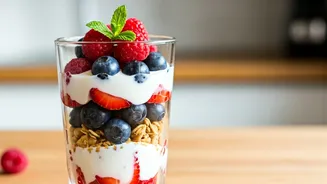Introduction: Gut Health
The importance of gut health has gained increasing attention in recent years, with research highlighting its connection to overall well-being. A healthy
gut microbiome, consisting of trillions of microorganisms, plays a vital role in digestion, nutrient absorption, and immune function. A diet high in sugar can negatively impact gut health by feeding harmful bacteria and disrupting the balance of the gut flora. Incorporating low-sugar options into one's diet can help foster a thriving gut environment, improving digestion, reducing inflammation, and potentially preventing chronic diseases. Choosing desserts that are mindful of sugar content while offering beneficial ingredients, such as fiber, probiotics, and antioxidants, can aid in supporting gut health. The following list of low-sugar desserts, as suggested by a Harvard-based gastroenterologist, offers a practical guide to making informed food choices for a healthier gut.
Fruit-Based Delights
Fruit-based desserts offer a natural sweetness and are often rich in fiber and vitamins, making them a great choice for gut health. One suggestion is a berry parfait made with layers of fresh berries, such as blueberries, raspberries, and strawberries, along with a base of unsweetened Greek yogurt and a sprinkle of nuts or seeds. Berries are packed with antioxidants, which help reduce inflammation, while Greek yogurt provides probiotics that support a healthy gut. Another option is baked apples or pears with a touch of cinnamon. The fiber content in these fruits aids in digestion, and the cinnamon has anti-inflammatory properties. These simple recipes provide a satisfying dessert while promoting a healthy gut environment.
Nut-Based Creations
Nuts are a good source of healthy fats, fiber, and protein, making them a beneficial addition to desserts that support gut health. One option is a chia seed pudding made with unsweetened almond milk and topped with nuts and seeds. Chia seeds are high in soluble fiber, which helps regulate blood sugar and supports a healthy gut. Another suggestion is homemade nut butter with sliced apples or celery. Nut butters provide healthy fats, and the fiber in the fruits and vegetables aids in digestion. When including nuts in desserts, it is essential to be mindful of portion sizes to keep the overall sugar content low and to ensure that the fats are from natural, unprocessed sources.
Chocolatey Treats
Chocolate can be included in a gut-healthy diet when selected carefully. Dark chocolate with a high cocoa percentage (70% or higher) is rich in antioxidants and can be enjoyed in moderation. A suggested dessert is a small square of dark chocolate paired with a handful of berries or a serving of unsweetened almond butter. Another option is a homemade chocolate avocado mousse. Avocados offer healthy fats, while cocoa provides antioxidants, creating a dessert that is both delicious and beneficial for gut health. The key is to choose high-quality dark chocolate with minimal added sugar and incorporate it as part of a balanced diet.
Alternative Sweeteners
Using alternative sweeteners in moderation can help reduce sugar intake while still enjoying delicious desserts. Stevia, erythritol, and monk fruit are examples of natural, low-calorie sweeteners that can be used. When creating desserts, it is important to be mindful of how these sweeteners affect taste and texture, as they can sometimes have a different sweetness profile than regular sugar. Recipes that incorporate these sweeteners might include sugar-free cookies sweetened with stevia or a fruit crisp sweetened with erythritol. These options allow for a more balanced approach to dessert consumption without compromising on taste.
Low-Sugar Baking Tips
Several strategies can be employed to reduce the sugar content in baked goods. When preparing desserts at home, it is possible to significantly decrease the amount of added sugar by using less or by swapping it for natural sweeteners. Incorporating ingredients like unsweetened applesauce or mashed bananas can add natural sweetness and moisture. Also, focusing on the quality of ingredients can enhance the flavor profile and reduce the need for excessive sugar. For example, using high-quality vanilla extract or cinnamon can add depth to the taste. Experimenting with recipes and making adjustments is key to finding the right balance of flavor and sweetness.
Portion Control Matters
Regardless of the dessert's sugar content, portion control remains a crucial element in maintaining gut health and overall well-being. Even low-sugar desserts should be consumed in moderation as part of a balanced diet. Being mindful of portion sizes can prevent overconsumption and support healthy eating habits. A simple strategy is to pre-portion desserts, whether baking a batch of cookies or preparing a serving of chia seed pudding. Serving desserts on smaller plates or storing leftovers away from sight can also encourage mindful eating. By practicing portion control, individuals can enjoy desserts without compromising their health goals.
Ingredient Awareness
Reading and understanding food labels is crucial for making informed choices about the ingredients in desserts. Pay close attention to added sugars, which can be found under various names, such as sucrose, fructose, and high-fructose corn syrup. Choosing desserts with natural, whole-food ingredients and minimal processing can help reduce sugar intake and support gut health. Look for options with high fiber content, which aids digestion, and those with beneficial nutrients like vitamins and antioxidants. When possible, opt for homemade desserts where you can control the ingredients and sweetness levels. Being aware of the ingredients helps to align dessert choices with one's health goals.
Hydration's Role
Alongside dessert choices, maintaining adequate hydration is important for promoting gut health. Water supports the digestive process, helps move food through the intestines, and prevents constipation. Drinking enough water can reduce bloating and support the overall health of the gut microbiome. Including water-rich foods in the diet, such as fruits and vegetables, can also contribute to hydration. Drinking water before, during, and after meals can help optimize digestion. It's recommended to consume at least eight glasses of water daily, depending on individual needs and activity levels. Staying hydrated complements a gut-friendly diet.
Professional Guidance
Consulting with a healthcare professional or a registered dietitian can provide personalized guidance on how to tailor dessert choices to support gut health. A doctor or dietitian can assess individual dietary needs, taking into consideration any health conditions or sensitivities. They can also offer specific recommendations on low-sugar dessert options based on individual dietary requirements. They provide the tools and information to improve overall gut health through informed dietary choices. Regularly consulting with a healthcare professional to ensure that dessert choices and dietary changes align with broader health goals is a valuable step towards maintaining a healthy gut.














